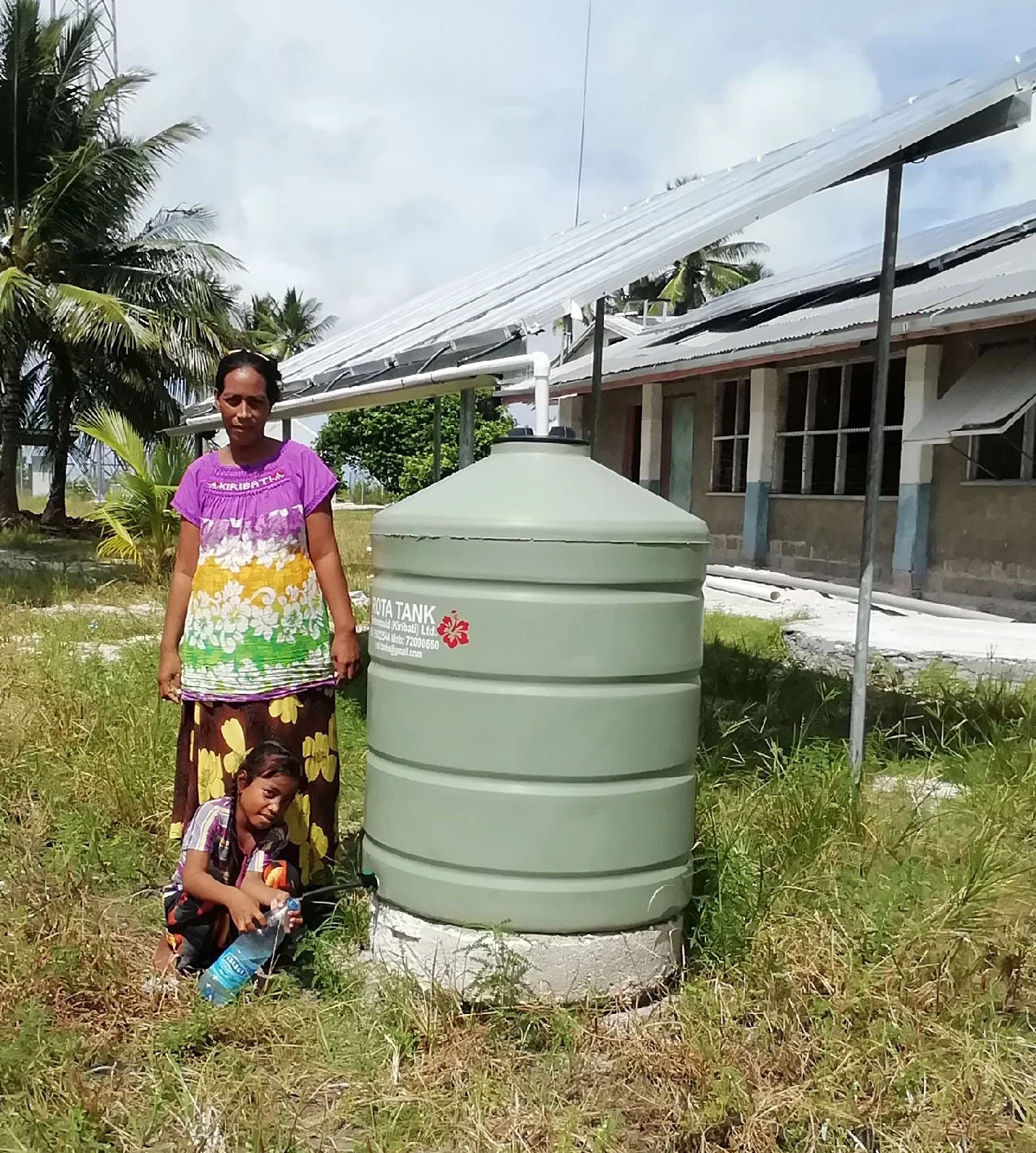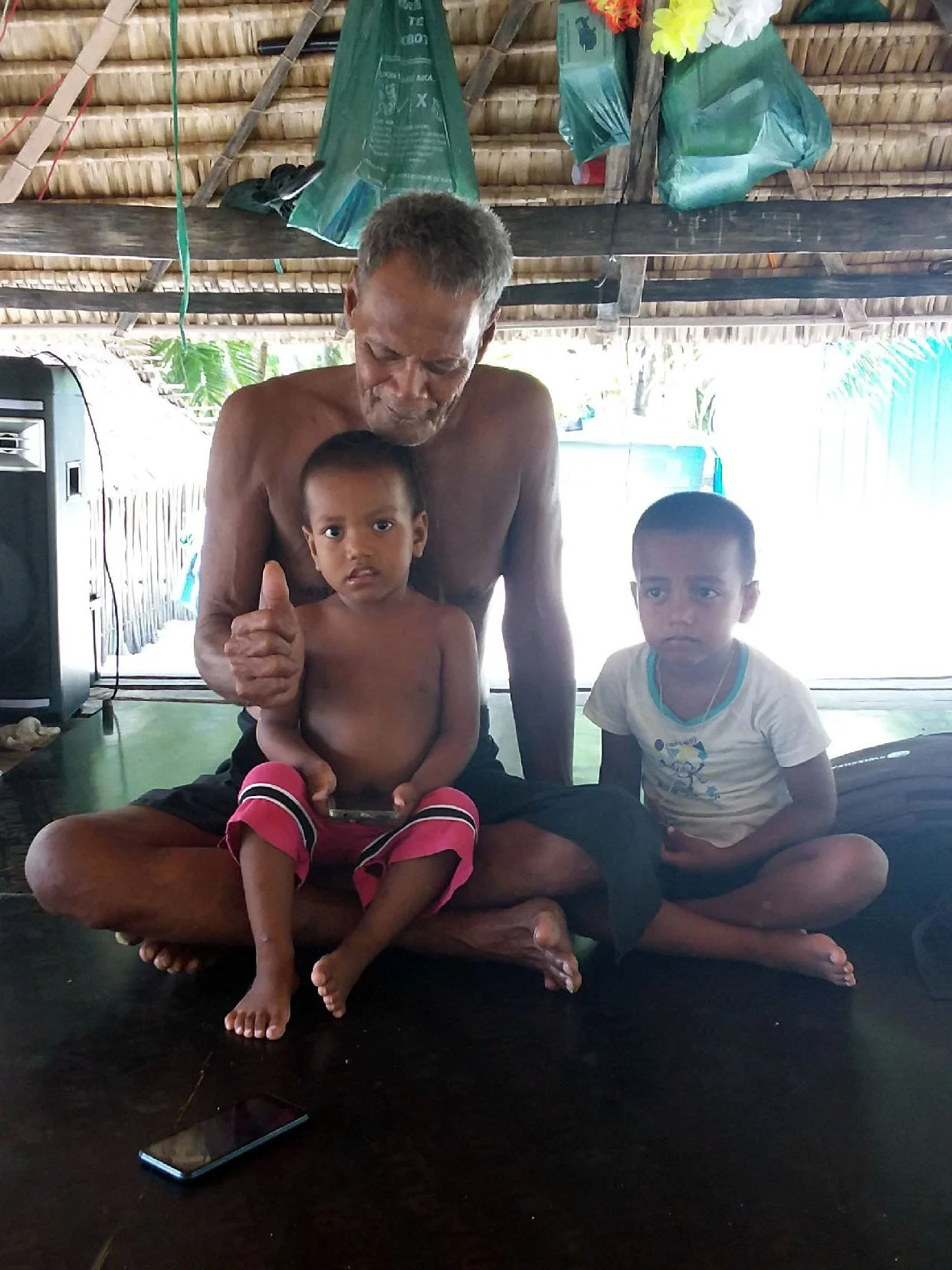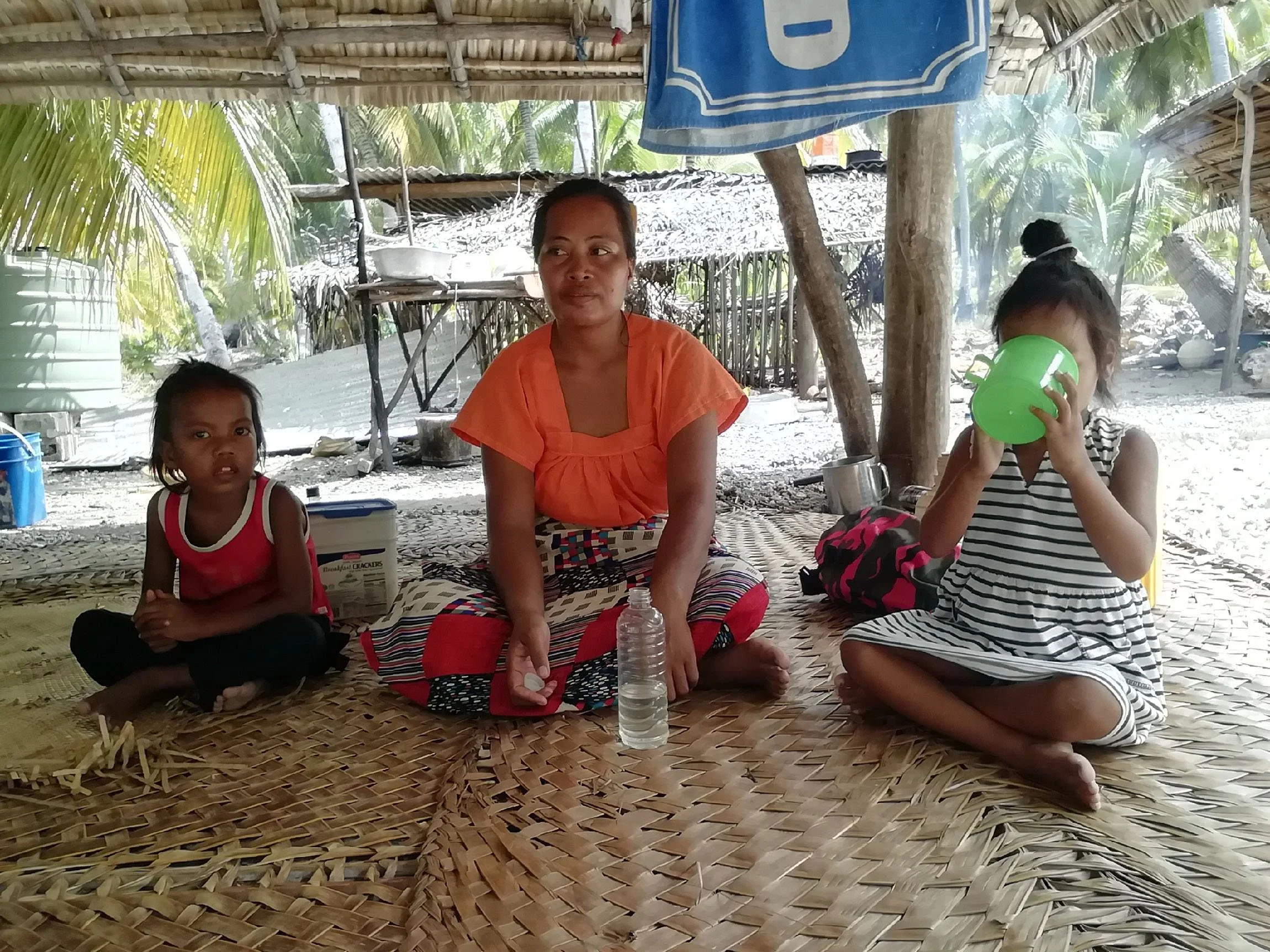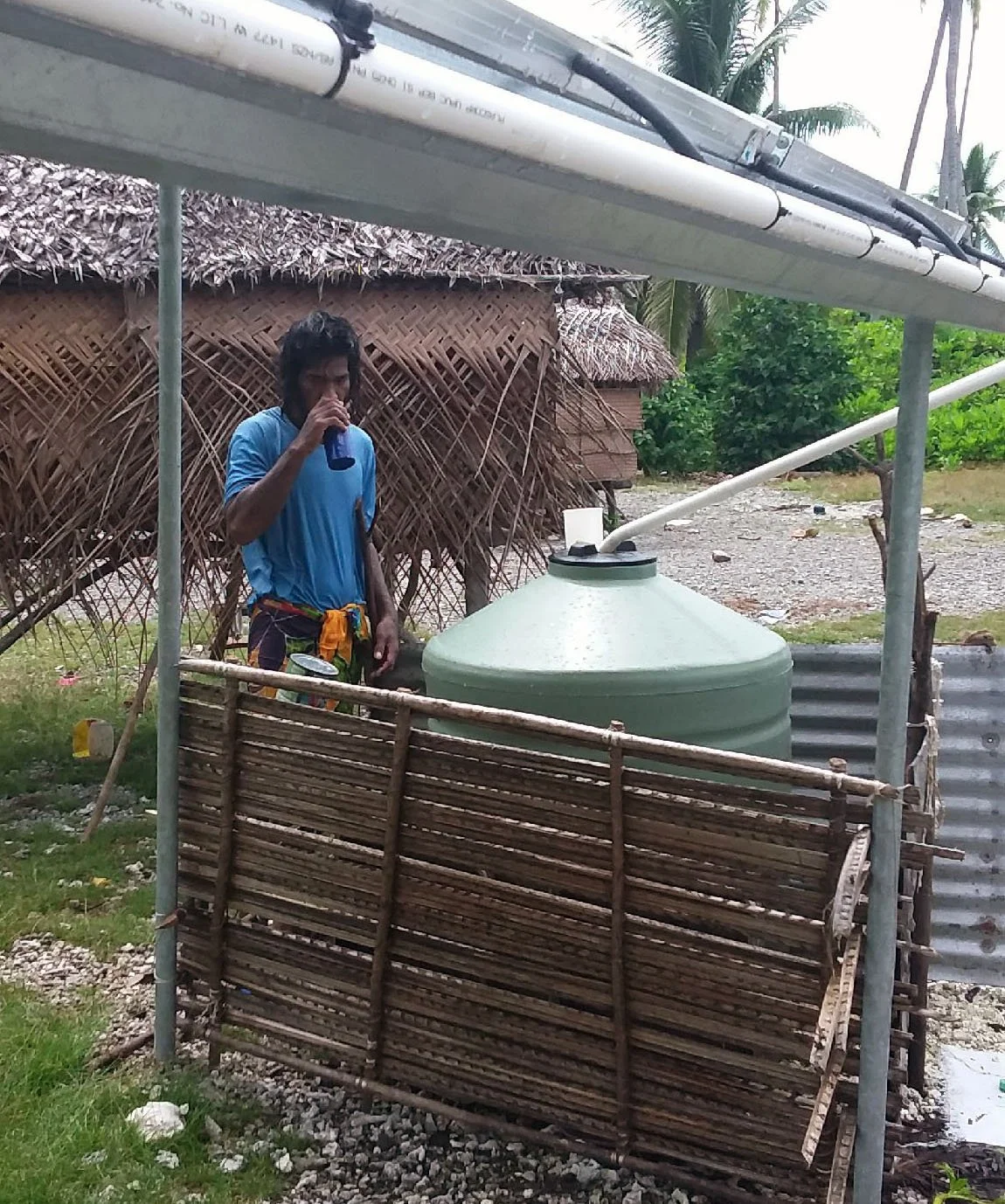Water is life: improving child health in Kiribati through solar power
Biritati and one of her children get drinking water from the new solar distillation unit on Beru Island. Photo: ChildFund Kiribati
When the small island nation of Kiribati entered into a drought emergency in 2022, the Australian Humanitarian Partnership was activated to provide emergency water, sanitation and hygiene support.
Many parts of Kiribati already faced fresh water shortages, due to the nation’s unique geography of low-lying atolls, as well as the impacts of climate change. Because of this, groundwater in Kiribati is only 1 to 2 meters deep and can be easily contaminated. As the drought became more acute, households could no longer collect rainwater for drinking, and existing wells were becoming increasingly brackish (salty).
With funding from the Australian Government, local organisations such as ChildFund Kiribati and Green Living were able to carry out scoping studies and establish solar water distillation units to provide clean, filtered water using the power of the sun. The units have so far been installed in 10 locations in densely populated Betio. Scoping and consultation has been carried out in 20 communities in the remote Outer Islands, with 12 units installed so far.
Some of the program participants have shared the impact of the solar distillation units on improving health, particularly for children, in their communities.
Above: Eribati with two of his grandchildren. Photo: ChildFund Kiribati
Eribati’s story
Eribati, 68, his five children and four grandchildren live in Temotu village: one of the most vulnerable villages to climate change on Nonouti Island. Usually he relies on rainwater for drinking, but during the drought there was simply not enough rain.
Eribati’s granddaughters suffered from sore and itchy skin, diarrhea, and vomiting as the drought worsened, and other children in the village were experiencing the same issues. The people in Temotu village were beginning to worry as waterborne illnesses were getting worse every day.
In June 2023, ChildFund Kiribati and Green Living team members visited the village to hold a community consultation. Eribati was very pleased to hear that there would be a solar water distillation unit installed at his village. The unit was installed in September 2023, and since then, 180 people in the village have been able to use it to regularly access clean drinking water.
Eribati said this has been “a great, wonderful help”, particularly in providing fresh and healthy water for the village children, which has reduced diarrhea, vomiting and other diseases. “Ever since I get my grandchildren’s drinking water from the system, they are no longer getting sick,” Erabati said.
Above: Metema with two of her children enjoying a drink of water. Photo: ChildFund Kiribati
Metema’s story
Metema, 36, is a mother of four who was born on the island of Beru and has been living there ever since. Metema and her family live in Teterio village, which was severely impacted during the drought. In the past, most of Metema’s drinking water came from rainfall, which was now very limited. Local well water was already salty before the drought hit.
In 2019 a solar pump was installed by the Kiribati Government, which pumped fresh water from a more distant well in the bush to households in the village. The water system worked well, but it did not supply enough to meet all their needs.
“In 2022 when we heard about the drought, that caused great concern to the mothers of my village. As a mother too, I [was] concerned that if this drought continued, the well we get our fresh water from for drinking could be affected and what would my children drink if that happened? Water is our life and I try to foresee the same problems my family had gone through when we used our well water that was salty before the solar water pump arrived. My great concern goes to my children’s health that they could be affected again with diarrhoea, vomiting, itchy skin, rashes, and sores.”
After consulting with the community, ChildFund Kiribati and Green Living installed a solar water distillation unit in the village, and community members were trained on maintenance. Metema’s family and 67 other people in her village have been fetching their clean drinking water from the unit ever since.
The machine “has provided fresh and clean water, like pure water bought from the shops,” Metema said. “Our water problems with the drought are ending and the health of my children will be more protected from diseases.”
Above: Bwaranika drinks some water from the solar distillation unit. Photo: ChildFund Kiribati
Bwaranika’s story
Bwaranika, 36, is father to an 8-year-old daughter and has been living on Abamakoro, an islet of Nonouti island, for twenty years. Abamakoro was particularly vulnerable during the drought because its well water is brackish and fresh water was already scarce.
Bwaranika and his family depend solely on community well water for drinking, a 20-minute walk from his house.
“Here on the islet the only source of fresh water for our daily drinking and cooking is two wells, as the other wells have brackish water. So, to get our fresh drinking water we have to walk 20 minutes to the centre of the islet where the community freshwater well is.”
Bwaranika has his own well, but it is not safe for drinking since it is salty. “We use it for bathing, washing, and cleaning dishes.”
When drought was declared in 2021, Bwaranika noticed a big change in the well water.
“Due to this prolonged drought, our community fresh well water, which we normally fetch our drinking water from, was also affected with saltiness. Since there is no other fresh water available to use for drinking, the people on the islet, including us, still use this water. Since the water from the well is salty, we no longer boil our drinking water because it is hard to drink when it’s boiled because it tastes even more saltier than unboiled water, so we prefer to drink straight from the well,” he said.
This impacted children’s health in Abamakoro, including Bwaranika’s daughter, who experienced frequent illnesses. This made Bwaranika very worried as he knew that if his daughter continued to drink unpurified water every day, she might get severely ill.
After community consultation, a solar water distillation unit was installed on the islet. Bwaranika and his family have been collecting their drinking water from the solar water distillation unit ever since it was installed.
“I’m very grateful for this kind of donation as my family now drinks fresh water. A special thanks to the Australian Government for their support in providing fresh water to our islet,” he said.
Thanks to collaboration between the Australian Humanitarian Partnership and Australian High Commission in Kiribati with the Kiribati National Drought Committee, Solar Water Distillation Committee, government agencies, the Office of the President, ChildFund Kiribati, ChildFund New Zealand, Green Living, Plan Australia and community members and leaders, more communities across Kiribati now have improved access to clean drinking water.





